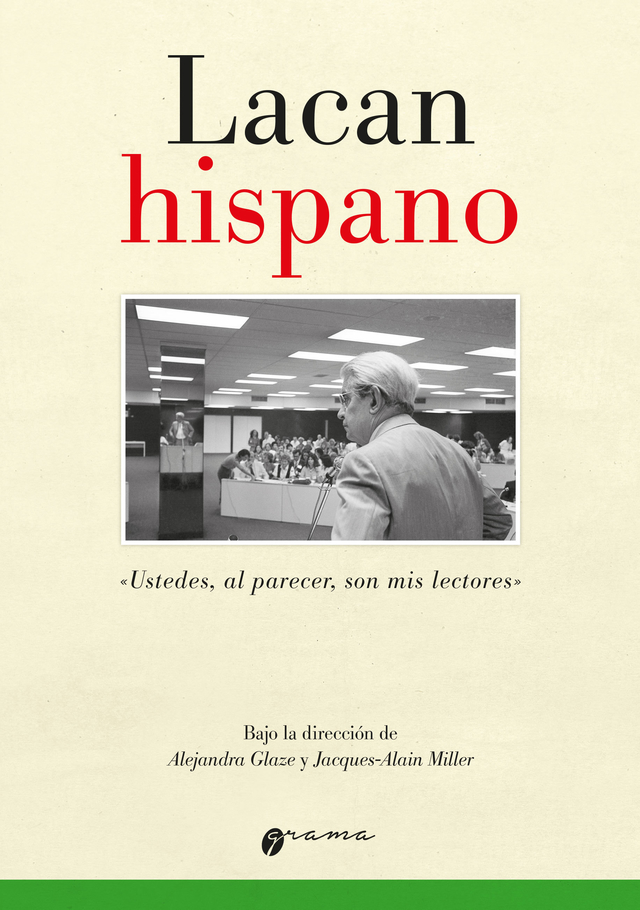
Recently, a few months after Lacan Hispano was published, I happened to hear the explanation of that weird first name launched by Jacques-Alain Miller on Twitter “Don Lacan de Francia”. Don Lacan de Francia, which emulated Don Quixote de la Mancha and evoked a so well-known piece of reading for those who speak Spanish that no Spanish speaker would ever ask who Don Quixote is, became bizarre for us. So finally, it turned into “Lacan Hispano” a name way more familiar, concise an explicative.
The book was published 40 years after Jacques Lacan’s death, in series with “Lacan Redivivus” for francophone readers. The objective of this book is to make explicit the impact that the encounter with Lacan’s teachings had on each of the authors, not all of them Spanish speakers. There is also a final section dedicated to the desire of Judith Miller, hard to read without dropping a few tears.
To anyone wondering how to prepare a tribute that is not a cemetery, this book is the example. Everything in it is alive.
Considering that each book that we approach is read in each one’s special way, I intend not to hide my particular reading of Lacan Hispano in this review.
The encounter with Lacan Hispano brought me great joy, something like a renewed “trust remedy” -as Jacques-Alain Miller said when founding the EOL, 30 years ago-. It came to me a few days after knowing that an EOL Delegation was about to be founded in Mendoza. I immersed myself in it searching for an answer, an orientation.
It is hard to make the review of a book that shows a vivid desire in its six chapters, that do not match a library categorization. It is an epistemic, clinical and political book
Alejandra Glaze, this number’s director alongside with Jacques-Alain Miller, indicates in the first article, which is left outside of the six rubrics as a prologue, that the authors not only speak about Lacan but they are also implicated in the way his legacy style was able to reach the Spanish language. That is why it is a real jewel to find the writings of Jorge Chamorro, Gerardo Maeso and Samuel Basz, who along with Oscar Masotta founded the first lacanian School.
So, this is how the 6 chapters go: none of them repeats lacanian theory, they take their inspiration from it as a motivation for their work. That is why every chapter begins with a Jacques Lacan quote:
“Lecturas Lacanianas”(Lacanian Readings) begins with a quote from The Ethics of Psychoanalysis (Lacan, 1959-1960 [2015]), about the creation around an emptiness. The 160 pages that follow are marked by it, in conversation with different art forms and psychoanalysis. There are articles for every taste.
In “Lacan y las Instituciones Analíticas” (Lacan and the Analytical Institutions) the quote is the famous “I found – as alone as I have always been in my relation to the psychoanalytic cause – (…)” (Lacan, 1964 [2012], p. 247) to speak about the loneliness with which one must inhabit the cause to be able to stay in the analytical institutions. My favorite articles are those in which an author from each of the Spanish speaking schools were asked what Lacan would think of their school today. Oscar Zack answers regarding the EOL and Andres Borderias for the ELP.
“Lacan y…” (Lacan and…) is inaugurated with a quote from the “Introduction to the German Edition of the Écrits”(Lacan, 1973 [2012]) where he explicitly highlights that there’s no psychoanalysis but about the particular; therefore there is tension between structure and discourse. In the chapter there is a wonder of clinical works: perversions, obsessive, psychosis, hysteria, love, children, lesbians, science, etc…
“Lacan y la Sexuación” (Lacan and Sexuation) a quote from “Talking to brick walls” (Lacan, 1972 [2012]) about the Real in both men and women, that thing that we cannot articulate a word about. Inside, a number of articles about love, the comedy of sexes, gender and sexuation in Lacan’s theory and following readings.
“Psicoanálisis y Política” (Psychoanalysis and Politics). This section arrived right on time. I can’t choose a single article, but I must say that Fabian Naparstek’s one touched me deeply. The opening quote speaks about the relationship between loneliness and politics, the really revolutionary reading that Lacan made of his time. I prefer not to spoil anything in this chapter so you can go and read it for yourselves. The Guillermo Belaga’s article is a frame to start thinking the dialogues concerning the next AMPs congress in 2024.
“Judith, la presencia de un Deseo” (Judith, the Presence of a Desire) The quote is obviously by Judith Miller. A finale with great fanfare and, as I told you earlier, also with a few tears. Each article frames the persistence of her desire and how she marked every institution and space she made possible to exist. It is a real pleasure to read how her life marked the life of each of the women who write in that section.
And in the end, when you close the book touched in the Real by the Symbolic register, you cannot avoid to feel interpreted by the Imaginary cover of the book. The picture is Lacan in Caracas, but it makes a “Meninas effect” by Velazquez: there’s a mirror, reflecting the observer but on it nobody but Jacques Lacan himself is reflected. There’s nothing left to say, but in fact accepting that we, apparently, are his readers. I should finally say that in this case you can actually judge a book by its cover.
